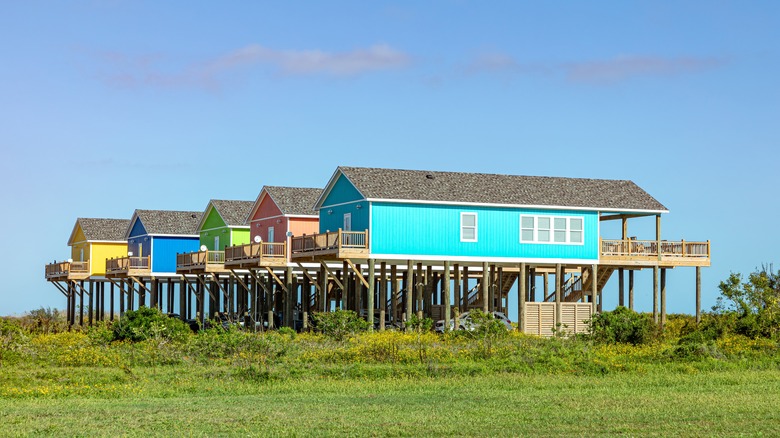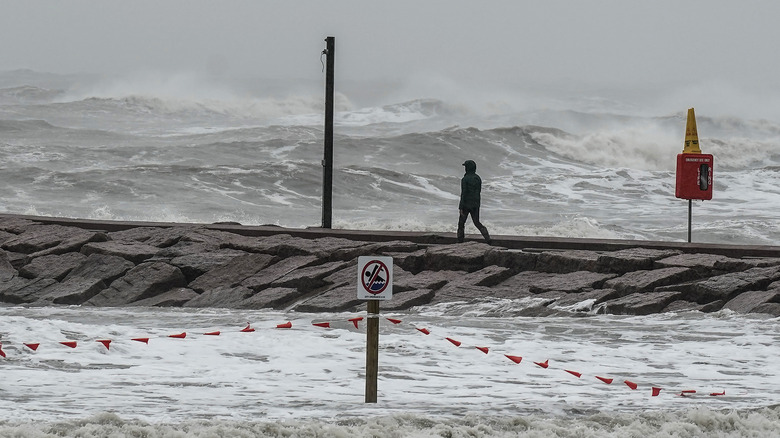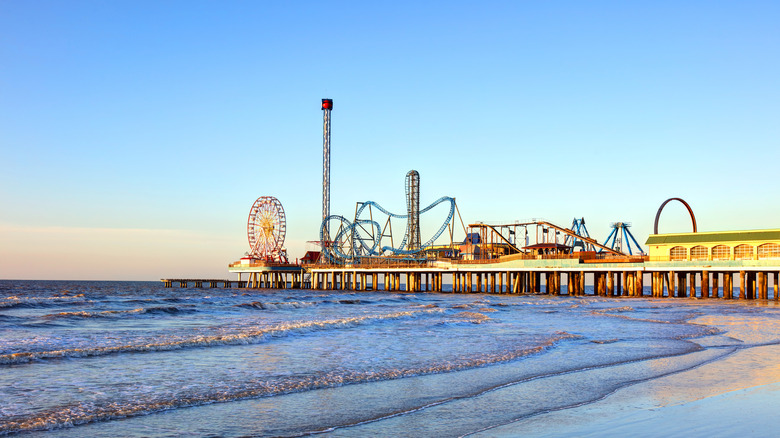When Hurricane Season Occurs In Galveston, Texas (And How Serious The Risk Is)
There's a good reason that colorful cottage you booked for a getaway to Galveston Island, home to one of the country's best beaches for a family vacation, sits high up on stilts. As a barrier island, Galveston is positioned to take the brunt of storm surge during a hurricane — up to 16 feet of surge in the event of a Category 4 storm like the one in 1900 that went down in history as the Great Galveston Hurricane, still considered the worst weather disaster in US history. With winds of 145 miles per hour, it killed an estimated 6,000 people on the island.
Peak hurricane season on the Texas Gulf Coast occurs in August and September — the 1900 storm struck in September, as did 2008's Hurricane Ike — but the official season is much longer, from June 1 through November 30. That's why the local tourist industry was surprised but not unprepared on July 8, 2024, when Category 1 Hurricane Beryl roared into town so early in the season. While power outages and debris cut into tourism, scrappy Galveston was open for business again ten days later, but anyone vacationing there at the time was in for a pretty bummer summer. Does this mean you have to white-knuckle it when booking your piece of paradise within that six-month window? Not necessarily. While there is good reason to be prudent when planning your trip to the Gulf Coast (trip insurance? Great idea!), the risks are actually quite manageable.
The risks of booking during hurricane season
How worried should you be that a storm that shares a name with your crazy ex-girlfriend will swoop in and destroy your Galveston Island honeymoon? In short, not very. Even though Texas is one of the five U.S. vacation destinations most likely to be hit by a hurricane, the relative risk to your vacation is small. A Category 3 or higher storm will hit the Texas Gulf Coast roughly every 15 years. Now, if you're looking at a 30-year mortgage, your odds of avoiding one don't look very good at all. But if you have a reservation for a long weekend, your odds are really great for having a blissful time, even during peak hurricane season.
Thanks to modern meteorology, unlike Galvestonians in 1900, you'll also have advance warning of an existing storm's possible path. The margin of error for predicting the track of a hurricane is 350 miles five days out but shrinks to 100 miles at one day's distance. If you have reservations at the beach for Friday, you'll know on Monday whether or not the storm is headed in the general direction of your destination, plenty of time to change plans if sideways rain and flying debris aren't your idea of a fun beach day. Looking for a last-minute refund? That can be more complicated.
Planning ahead for Galveston's hurricane season
Hotel policies on weather-related cancellations can vary, although most do offer them for truly dangerous weather (heavy rain doesn't count). Some rental property companies explicitly state that they will offer no refunds for cancellations due to hurricanes and refer guests to travel insurance policies to protect against such an eventuality (as a rule, these policies will cover hurricanes if bought before the storm has been given a name). During the lead-up to Hurricane Beryl, Airbnb was known to leave it up to Galveston hosts to decide whether or not to offer refunds, as its Major Disruptive Events Policy excludes weather events in areas that are known to have, well, weather events. So no automatic cancellations on Airbnb for hurricanes in places that have hurricane seasons, unless a mandatory evacuation order is in place. Too much fine print? You could just go to one of eight Caribbean islands safe from hurricanes instead.
If you do make it to gorgeous, glorious Galveston under sunny skies, definitely check out the cult-favorite hurricane tour led by Dr. "Hurricane Hal" Needham, a dashing meteorologist and real-life storm chaser (Glen Powell would totes play him in a biopic). This tour includes breathtaking survival tales from hurricanes past and the jaw-dropping feats of engineering by which the entire town was raised by as much as 17 feet after the Great Galveston Hurricane, earning it the permanent nickname "the city on stilts."


